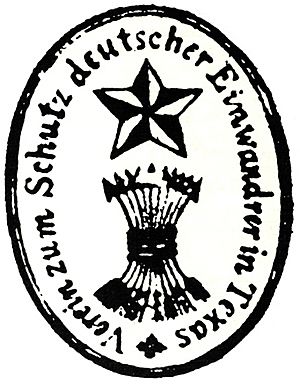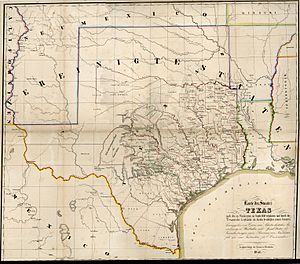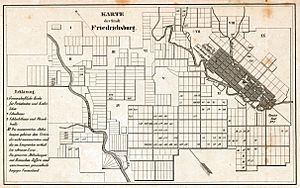Adelsverein facts for kids
The Mainzer Adelsverein (pronounced like "MYNT-ser AH-dels-fer-ine") was a group of German noblemen. They formed a society on April 20, 1842. Their goal was to create a new German settlement in Texas. The full name of their group was Verein zum Schutze Deutscher Einwanderer in Texas, which means "Society for the Protection of German Immigrants in Texas."
Contents
History of the Mainzer Adelsverein
The Adelsverein was started by 21 German noblemen. They met on April 20, 1842, in a town called Biebrich, near the Rhine River. This meeting took place at the castle of the German Duke of Nassau. He later became Adolphe, Grand Duke of Luxembourg and was named the "Protector" of the society. In Germany, the group was known as the Mainzer Adelsverein. This name came from the city of Mainz, where it was officially registered.
The society wanted to create a "New Germany" in Texas. They planned to do this by helping many Germans move there. The Adelsverein would buy land for these new settlers. They also hoped to get land grants from the Republic of Texas.
Early Land Purchases and Decisions
On January 9, 1843, Count Ludwig Joseph von Boos-Waldeck bought a large piece of land. It was 4,428 acres in Fayette County, Texas. He paid 75 cents an acre. This land was named Nassau Plantation after the Duke of Nassau. At first, this plantation was meant to be the main place for German immigrants to settle.
However, in 1844, Prince Carl of Solms-Braunfels visited the plantation. He suggested that the society sell the property. This was because the society did not want to be involved with practices that were not aligned with their goals. The plantation was sold on July 28, 1848, to Otto von Roeder.
First Settlements in Texas
In May 1844, Prince Carl was chosen to lead the Adelsverein's efforts in Texas. He was called the "commissioner general." Each family moving to Texas had to pay the Adelsverein a certain amount of money. This money covered their travel and housing. It also gave them credit until they could harvest their first crops.
The first immigrants sponsored by the Adelsverein arrived in Galveston in July 1844. They then traveled to Indianola in December 1844. From there, they moved inland to land the Adelsverein had bought near Comal Springs. Prince Solms named this first colony New Braunfels. He named it after his home region.
Expanding Settlements and Treaties
Henry Francis Fisher and Burchard Miller sold their 1842 land grant to the Adelsverein on June 22, 1844. This grant was meant for even more settlements in Texas. After Prince Solms went back to Germany, John O. Meusebach became the second commissioner general in April 1845.
Meusebach founded the next settlement on the edge of the new land grant. He named it Fredericksburg. This was in honor of Prince Frederick of Prussia, a member of the Adelsverein. This land grant was in Comanche territory. To settle there safely, Meusebach first made a treaty with the Penateka Comanche people. He also made a separate agreement with a group called the Darmstadt Forty. They planned to create socialist colonies within the land grant.
In 1853, the Adelsverein stopped its colonization efforts in Texas. This was because the society had a lot of debt.
Darmstadt Society of Forty
The Adelsverein worked with another group called the Darmstadt Society of Forty. They agreed to help 200 families settle in the Fisher–Miller Land Grant area of Texas. In return, the Darmstadt Society was supposed to get money, animals, tools, and food for a year. After the first year, the colonies were expected to support themselves.
Some of the colonies they tried to start were Castell, Leiningen, Bettina, Schoenburg, and Meerholz in Llano County. They also tried Darmstädler Farm in Comal County and Tusculum in Kendall County. Out of all these, only Castell still exists today.
These colonies failed after the Adelsverein stopped providing money. They also had problems with how they were organized and who was in charge. Some members moved to other Adelsverein settlements in Texas. Others moved elsewhere or went back to Germany.
Texas Settlements
Fisher–Miller Land Grant colonies
- Bettina, Llano County
- Castell, Llano County
- Leningen, Llano County
- Meerholz, Llano County
- Schoenburg, Llano County
Other Settlements
- Indianola, Calhoun County
- Fredericksburg, Gillespie County
- Nassau Plantation, Fayette County
- New Braunfels, Comal County
- Sisterdale, Kendall County
- Tusculum, Kendall County
- Gruene, Comal County
- New Ulm, Austin County
- Schertz, Texas
Members
Founding Members
- Adolf, Duke of Nassau
- Bernhard II, Duke of Saxe-Meiningen
- Ernest II, Duke of Saxe-Coburg and Gotha
- Prince Frederick of Prussia
- Friedrich Günther, Prince of Schwarzburg-Rudolstadt
- Carl, 3rd Prince of Leiningen
- Prince Hermann von Wied
- Prince Ferdinand von Solms-Braunfels
- Prince Franz von Colloredo-Mansfeld
- Prince Otto Victor von Schoenberg-Waldenburg
- Prince Carl of Solms-Braunfels (Prince of Solms-Braunfels Rheingrafenstein)
- Prince Alexander von Solms-Braunfels
- Count Christian von Alt-Leiningen-Westerburg
- Count Viktor August of Leiningen-Westerburg-Alt-Leiningen
- Count Carl Frederick Christian of Castell-Castell
- Count Carl von Isenburg-Meerholz
- Count Edmund von Hatzfeld
- Count Carl William von Inn und Knyphausen-Lutelsberg
- Count Armand von Rennesse
- Count Carl von Castell
- Baron Paul Scirnay
Leadership
- Archduke of Nassau – Protector
- Carl, 3rd Prince of Leiningen – President
- Count Carl Frederick Christian of Castell-Castell – Vice President, Executive Secretary-Business Director
- Count Viktor August of Leiningen-Westerburg-Alt-Leiningen – Co-founder
- Count Ludwig Joseph von Boos-Waldeck – Co-Founder
- Baron August von Bibra – General Manager
- Gustav Dresel – Special Business Agent
- Philip Cappes – Special Commissioner
- Prince Carl of Solms-Braunfels – First Commissioner-General
- John O. Meusebach – Second Commissioner-General
- Hermann Spiess – Third Commissioner-General
 | Aurelia Browder |
 | Nannie Helen Burroughs |
 | Michelle Alexander |




